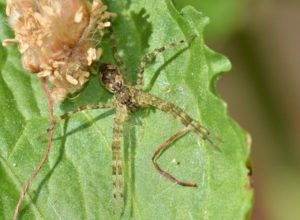Fishing Spider Control: Protect Your Home or Business
Facts
- Fishing spiders only use webs to house their young.
- These pests eat insects, small fish, and tadpoles.
- True to its name, the fishing spider hunts for prey in aquatic habitats.
- Able to walk on the surface of water, fishing spiders thrive in moist areas.
- Fishing spiders are prevalent throughout the Eastern United States.
Appearance
Fishing spiders are fairly large, with a leg spread between three and four inches. Females are larger, measuring up to an inch long, while males are only about half this size. Both are brownish-gray in color with black markings and banded legs. Juveniles look like smaller versions of the adults.

How Do Fishing Spiders Get Inside Buildings?
Many of these arachnids climb trees, making their way onto roofs where they slip through cracks and unsealed windows. This particular species of spider might also come in through damaged foundations. Though they prefer to live outdoors, they may head inside seeking a place to hibernate over the winter.
Some types of spiders (including fishing) may end up in dark spaces, like storage rooms in warehouses and manufacturing facilities. Open loading doors offer ample opportunity to enter, especially if there are plenty of insects to eat. You may also find them in boats and around docks, as well as in apartment buildings and nursing homes near the woods.
Signs of a Fishing Spider Infestation
- Sightings – Although these pests are shy and can move quickly, their size makes them easy to spot.
- Movement on Water – You may notice fishing spiders walking and diving on lakes, streams, and ponds.
- Molts – As they grow, young spiders molt several times. If you see this shed skin, they are probably nearby.
Problems Caused by Fishing Spiders
Most spiders mostly hide from humans and other predators, particularly when indoors. However, they may bite if they become trapped against your skin by clothing or shoes. Though this is rarely more severe than a mild bee sting, those who are sensitive to venom may have a stronger allergic reaction.
If you’re afraid of spiders, these robust pests can cause reason for alarm. Waterfront hotels and restaurants should take extra precautions against these spiders. Though relatively harmless, they can scare or deter customers, which can result in a loss of income and poor reviews.
Prevention Tips
The first step to keeping fishing spiders out is to repair any exterior gaps. You should also clear away brush and debris close to foundations to remove potential hiding places. If you find a fishing spider, carefully scoop it up with a jar and place it outside. To safely remove an infestation, contact Western Pest Services and speak to a professional today.